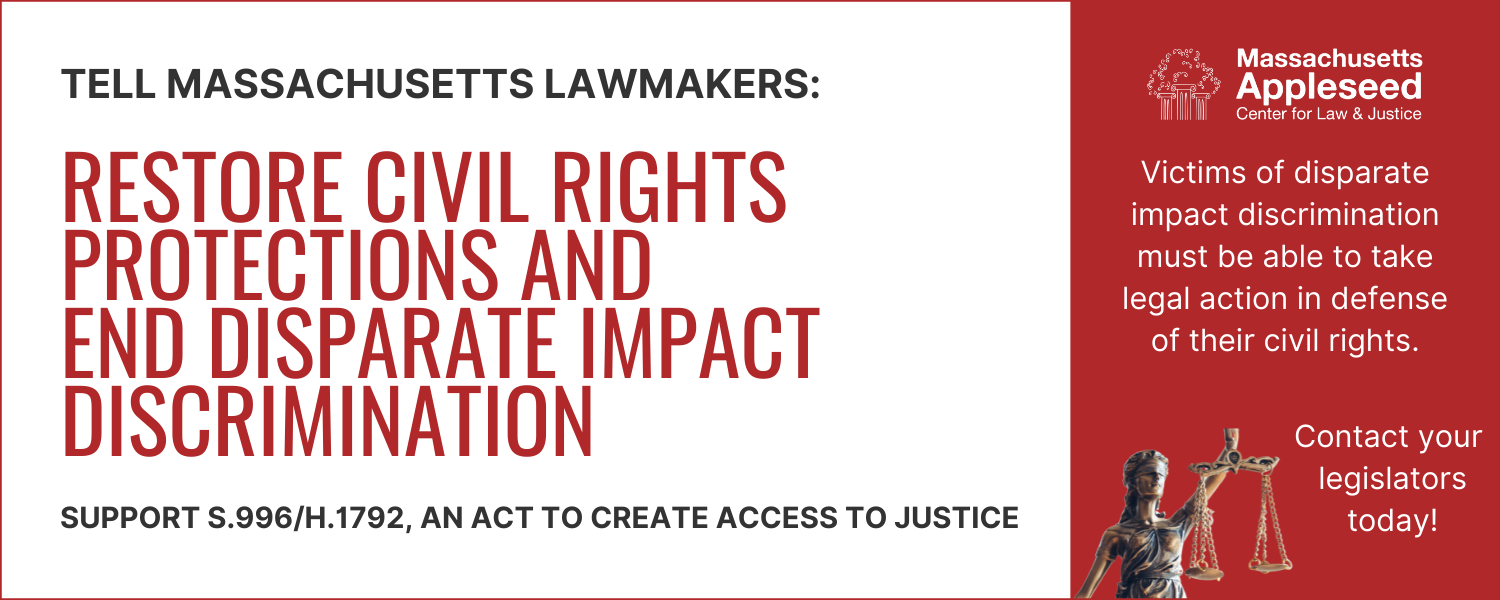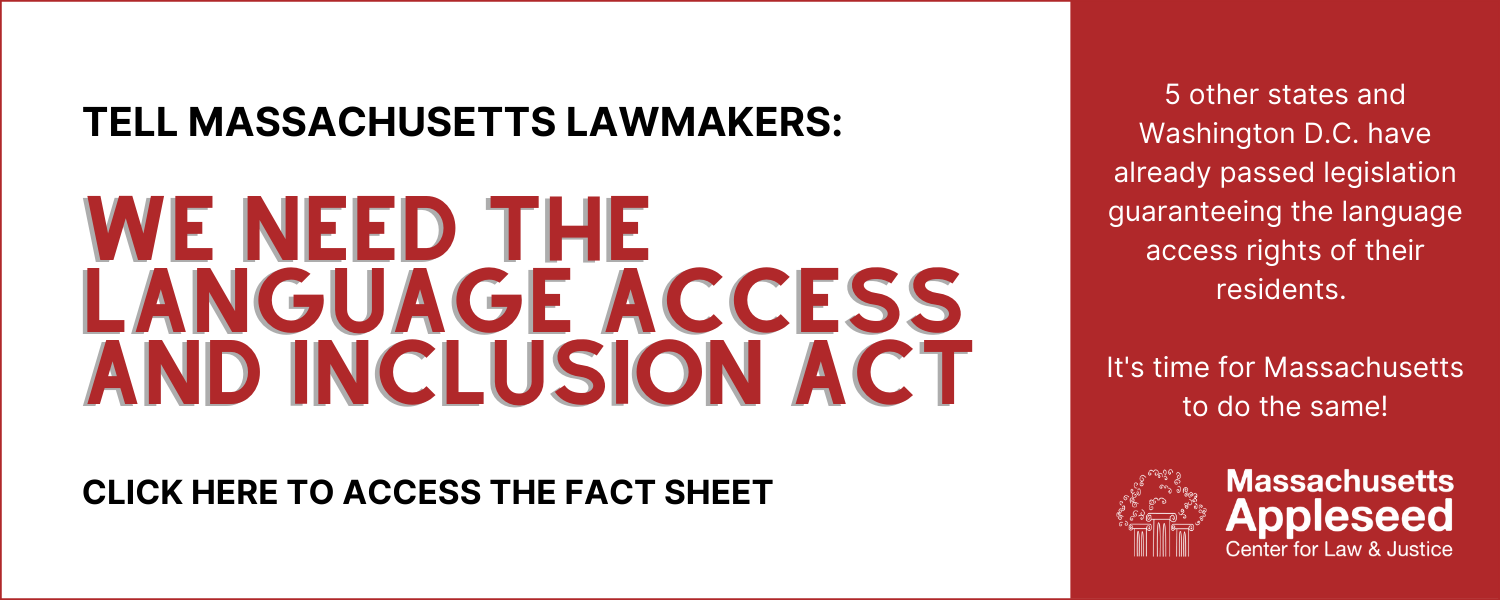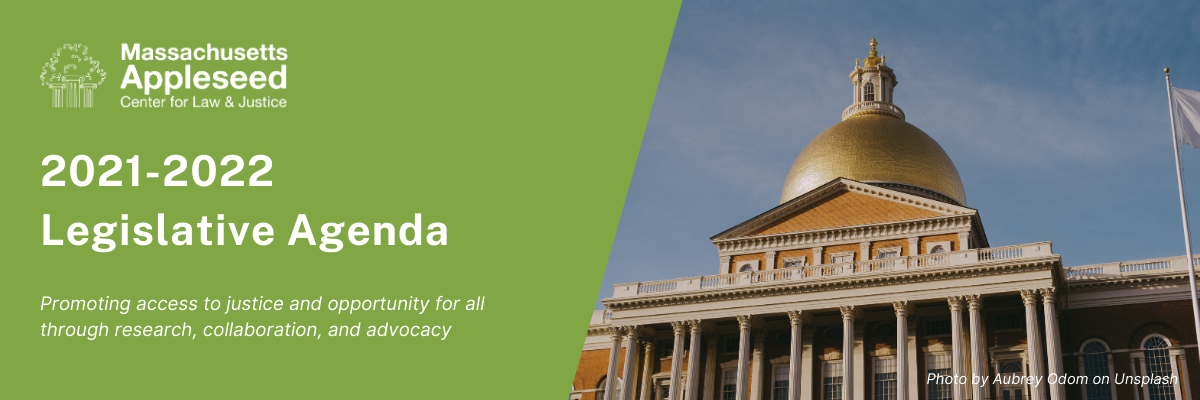Boston, MA, July 14, 2021 – Today, Haitian-Americans United, the Greater Boston Latino Network, and Jane Doe, a mother and immigrant with Limited English Proficiency (LEP), filed a civil rights complaint under Title VI of the Civil Rights Act against the Massachusetts Department of Children and Families (DCF) in response to the agency’s failure to provide federally mandated language access to the LEP families they serve. The complaint, filed by Lawyers for Civil Rights and Massachusetts Appleseed Center for Law and Justice, asks the federal Department of Health and Human Services (HHS) to compel DCF to comply with legal mandates to provide language access services to Massachusetts families.
DCF’s failure to provide adequate language access to LEP parents directly results in the wrongful separation of non-English speaking families across the Commonwealth. As a recent report by Appleseed documents in detail, when DCF fails to prioritize language access, LEP parents are unable to comprehend or meaningfully participate in DCF’s processes. As a result, LEP families face an increased likelihood of separation compared to their English-speaking counterparts. In fact, Latinx families are more overrepresented in foster care in Massachusetts than in any other state.
“The level of harm we’re talking about is immeasurable,” said Deborah Silva, Executive Director of Massachusetts Appleseed Center for Law and Justice. “The wrongful and unjust separation of families leaves children traumatized and denies parents their fundamental rights. DCF must be held accountable and meet the needs of the non-English speaking populations they serve.”
DCF has been on notice of its civil rights violations for years and has had ample opportunity to remedy its discriminatory practices. In 2018, HHS investigated a Title VI complaint made by a Spanish-speaking person who had received inadequate language assistance from DCF. The investigation brought to light DCF’s woefully inadequate use of interpreters for LEP families. Following the investigation, HHS issued a set of voluntary compliance measures intended to bring DCF’s language access practices in line with federal law. But DCF refused to comply voluntarily. In the absence of ongoing monitoring and enforcement, DCF has continued to deprive non-English speaking families of meaningful language access, and consequently access to their children.
“Our foster care system has a long and disturbing history of separating families of color and immigrant families,” said Erin Fowler, attorney at Lawyers for Civil Rights. “DCF’s failure to provide adequate language access is discrimination against immigrants and families of color. Federal intervention is critically needed to ensure that families are not wrongfully separated.”
The complaint calls for immediate federal intervention and oversight to compel DCF comply with its federal obligation to provide meaningful access to LEP individuals. Specifically, the complaint requests that HHS order DCF to adopt and implement a comprehensive remediation plan for meaningful access by LEP individuals. The remediation plan should:
- require DCF to conduct a language access audit, create a meaningful language access plan, and hire Regional Language Access Coordinators, placing at least one Coordinator within each of DCF’s five regions;
- set concrete targets for hiring bilingual caseworkers for languages frequently encountered, with a focus on the needs of individual area offices;
- require quarterly trainings for all caseworkers and contract interpreters on the importance of language access, tools and techniques for competent interpretation, the importance of confidentiality and impartiality, and DCF terminology and procedures;
- require that interpreters be present during all visitations, phone or video conversations, and interactions with LEP individuals;
- expressly forbid the use of family members, relatives, friends, neighbors, and children as interpreters;
- require the translation of all vital documents into the preferred languages of LEP individuals;
- require all community social service providers DCF contracts with to offer in-person interpretation services, or else allow providers access to DCF’s telephonic interpretation services;
- require the creation of policies and procedures describing detailed steps for caseworkers to identify alternative social services for LEP families;
- require DCF to adopt more flexible protocol to acknowledge the difficulty many LEP families experience when attempting to receive non-English social services;
- require the creation of policies and procedures describing detailed steps DCF should take upon receipt of a language access complaint; and
- require DCF to take any other steps that are necessary to achieve full compliance with federal law.
“Due to DCF’s failures, we have been forced to try to do DCF’s job for them—by providing community interpreters or translating documents that members have received in English,” says Dieufort Fleurissaint, Chair of the Board of Directors of Haitian-Americans United, the lead complainant in the case. “This drains our limited resources and harms our LEP members. HHS must ensure DCF remedies these wrongs and complies with federal law.”
Family separation is unfortunately not limited to our southern border—it happens right here in Massachusetts. DCF must provide adequate language access to LEP families and, put simply, stop tearing immigrant families apart.
The complaint is available here.
About Massachusetts Appleseed
Massachusetts Appleseed’s mission is to promote equal rights and opportunities for Massachusetts residents by developing and advocating for systemic solutions to social justice issues. The nonprofit researches and identifies the ways in which the justice system, schools, and government agencies have systematically failed impoverished and vulnerable communities, challenges harmful public policies that perpetuate injustices and inequities, advocates for statewide policy solutions, and develops know-your-rights resources for those impacted. (https://massappleseed.org)
Want to stay informed on the latest issues Massachusetts Appleseed is working on?
Sign up for our mailing list.





